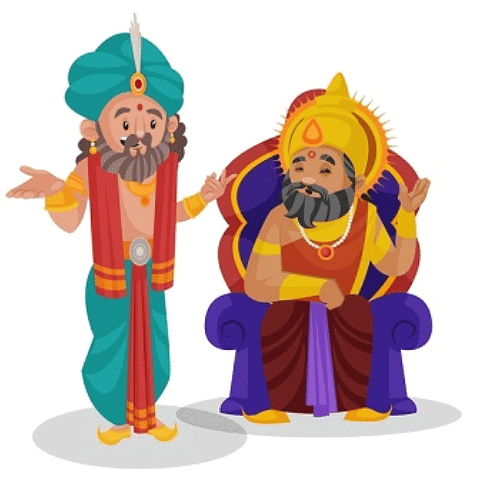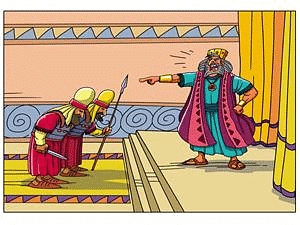Key Points of the Story
- The king and minister of the Kingdom of Fools decide to reverse day and night, enforcing a rule that everyone must be awake at night.
- A guru and his disciple visit the city and witness the peculiar behavior of the inhabitants.
- The disciple decides to stay in the kingdom due to the cheap prices of goods, despite the guru's warnings.
- An incident involving a thief's death leads to a chain of accusations and revelations.
- The story culminates in a series of events where justice is sought through a complex chain of events.
- The guru and disciple end up in a situation where they manipulate circumstances to become the new rulers of the kingdom.

Detailed summary
Once upon a time, a guru and his disciple arrived in a strange kingdom where everything was topsy-turvy: people and animals worked at night and slept during the day. They were amazed to find that everything in the kingdom was sold for the same price, just one duddu. The guru, wise and insightful, sensed something was off and left the kingdom quickly. However, his disciple, who loved food and was intrigued by the low prices and odd ways of the kingdom, decided to stay despite the guru’s warning.
In this kingdom, a curious incident occurred. A thief broke into a rich merchant’s house but was killed when a wall of the house suddenly collapsed. The thief's brother demanded justice from the king, insisting that the merchant should be punished for building a weak wall. When the king investigated, the merchant passed the blame to the bricklayer for constructing a poor-quality wall. The bricklayer then accused a dancing girl of distracting him while he worked, and she, in turn, blamed a goldsmith. The goldsmith shifted the blame back to the rich merchant's father, who had rushed him to make jewelry for a family wedding.

After hearing all these arguments, the king concluded that the merchant was the real culprit. However, when they tried to punish him using a special stake, they found he was too thin to fit. The king then ordered to find someone who would fit the stake for the punishment. Coincidentally, the guru’s disciple, who had been enjoying the cheap food in the kingdom, had become quite fat and was chosen as the suitable replacement.
Realizing his grave mistake and remembering the guru's wise words about the foolishness and unpredictability of the kingdom's people, the disciple was filled with regret. Just then, his guru, who foresaw this danger, returned to the kingdom. The guru cleverly concocted a plan: he told the king that the stake was magical and that whoever was punished first would be reborn as a king, and the second one as his minister.
The greedy king and his minister, enticed by the prospect of being reborn as rulers, decided to spare the disciple and take the punishment themselves. They secretly released the guru and his disciple, and went through with the punishment, hoping to secure a royal future. After this dramatic turn of events, the people left without a king and minister, chose the guru and his disciple to lead them, honoring their wisdom and insight.
Theme/ Message
Themes:
- Deception and Justice
- Consequences of Greed
- Manipulation and Power Dynamics
- Wisdom and Folly
Message:
- The story highlights the intricate nature of justice and how deception can lead to unintended consequences.
- It emphasizes the importance of wisdom over folly and the repercussions of selfish actions.
- Through a series of events, the narrative suggests a message about the cyclical nature of justice and the role of manipulation in societal dynamics.
Glossary
- Accuse - To say that someone has done something wrong or illegal.
- Bailiff - A law officer who ensures that court decisions are followed.
- Bricklayer - Someone whose job is to build things with bricks.
- Burglar - A person who illegally enters buildings to steal things.
- Clamour - To demand something loudly.
- Compensate - To give someone something, usually money, for loss or damage.
- Complicate - To make something more difficult to understand or deal with.
- Criminal - A person who has done something against the law.
- Decisively - Doing something in a way that shows confidence and clear choices.
- Decree - An official order by someone in power.
- Delight - A strong feeling of happiness.
- Distracted - Not able to pay attention because you're thinking of something else.
- Execution - The act of killing someone as a legal punishment.
- Fragile - Easily broken or damaged.
- Goldsmith - A person who makes things out of gold.
- Guilty - Having done something wrong or illegal.
- Highness - A title used for someone of royal rank.
- Impaling - To stick a sharp object through something.
- Impatient - Not willing to wait for something or someone.
- Injustice - When things aren't fair or just.




